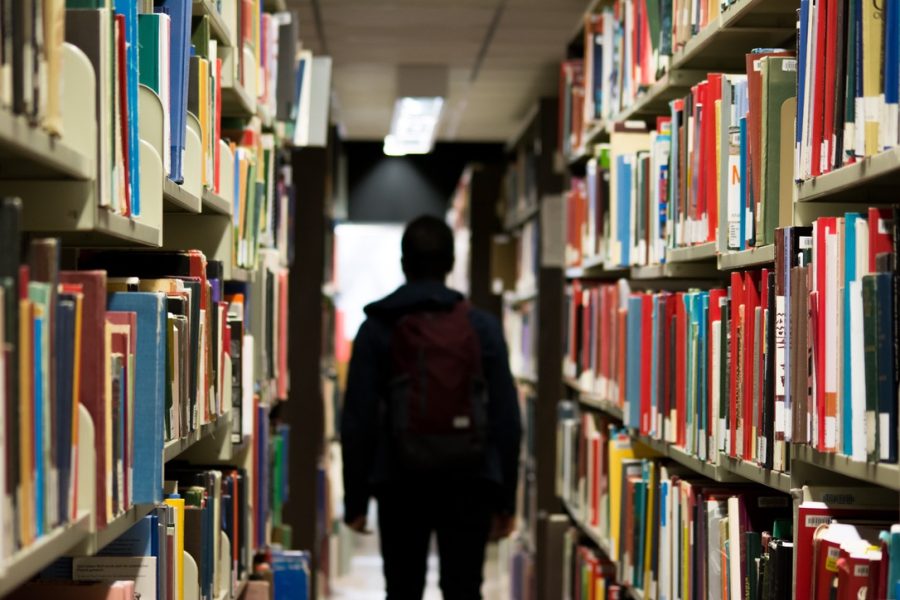Don’t Let ‘High Achieving’ Students Make You Feel Anything Less
The rigors of every student’s academic course load should be specific to the student, and should leave time and energy to pursue social goals, time with family and friends.
Used with permission from Unsplash
Student at library. As students all around the nation head back to school, many still struggle with comparing themselves to others and obsessing over academics. Students believe that acceptance into the top schools can only come from being one step ahead of their peers. As a result, many students that left high school have permanent damage to their mental, physical, and emotional states.
October 19, 2022
Out of everything that causes stress for teens—whether it’s their home life, peers, academics, or health—school can be the most anxiety-inducing.
This anxiety is only compounded by our culture’s obsession with highlighting youth who have extraordinary academic potential or achievements. Alena Wicker, a 13-year-old African-American from Fontana, California, made news this July when she got accepted into medical school.
Wicker graduated high school in Arizona at the age of 12, a major milestone, and is now attending Alabama’s prestigious Heersink School of Medicine.
Someone achieving so much at such a young age might make others feel insecure about their own accomplishments, but few are willing to consider the multiple definitions of success—and the fact that education might entail more than just numbers, rankings, and certificates.
All About Balance
While it’s true the main purpose of school is to further students’ education, that’s not the only reason they enter the building every weekday morning.
Besides education, school allows for students to develop and strengthen social skills with their peers and teachers, as well as enjoy extracurricular activities such as sports or clubs. Additionally, students have the opportunity to prepare for college and adulthood by learning the proper formalities when writing emails, using grammar correctly when communicating, and so on.
Although there’s so much more to school than classic education, it’s very common for high school students to overexert themselves specifically in this department; this is often due to pressure from their parents or siblings, but can also come from themselves.
Many students believe that the only way for them to reach the college of their dreams comes from loading up on seven AP (Advanced Placement) classes, or becoming the president of as many clubs as possible; many times it’s both.
As a result, some students tend to reject a social life or anything outside of the academic sphere because they strive to be the valedictorian or salutatorian of their class, when in fact this can present the most memorable aspect of their experience.

As important as it is to implement healthy study habits, pursuing other activities such as sports, theater, art, etc. can be just as critical to students’ future life.
At South, there are tens upon hundreds of talented students whose skills range from the halls of academia to the field of sports, and many who do both, and genuinely take pleasure in being a part of what school has to offer outside of an exclusively academic focus.
All the Right Notes
One of South’s high achievers, Aidan Wang, is a true War Eagle. Wang, an 11th grader at South, is not a typical student. In addition to his talents in the classroom, Wang is a top notch fencer and saxophone player, both unique compared to the more popular sports.
Not only does he specialize in fencing, but he does programming and plays an instrument as well. Wang multitasks between his rigorous academic life and all of the other extracurriculars to which he devotes his energy.
“In addition to being a member of the Olympic Fencing Club, I am a competitive programmer and am in the second highest division of the USA computing Olympiad. I also play the saxophone in school and participate in South’s Mastery band,” said Wang.
In Wang’s situation, it’s crucial to note that he’s just as actively engaged outside of school as within. Not only does he master academic life, but everything else around him.
While he is deeply hardworking and dedicated to his studies, the structure of Wang’s brain itself may have boosted his natural aptitude for learning.
Grey Matters
Individuals like the 13-year-old Wicker and their innate gift for learning are incredible students that rise above the occasion. However, this doesn’t mean that other students aren’t just as accomplished.
In fact, the word “high-achieving” should not necessarily be used to describe students like Wicker. The psychological sciences tell us that an individual with inherent intelligence and the motivation to break barriers might not possess the same brain structures as so-called average students.
“The Gifted Research and Outreach Program has put together research that shows the neural process of a gifted student, and refers to their brain scans looking like they are ‘on fire’ due to the high amount of neural activity,” said Melissa Mendez, an AP Psychology and U.S History teacher at South Forsyth High School.
Researchers have found major differences in the neural connections of a gifted student compared to that of a “typical” student. Generally, gifted students possess more grey matter which accounts for larger frontal, temporal, parietal, and occipital lobes, thus allowing their brain to execute more tasks more efficiently.
Brain scans of gifted students also show an increase of the neurotransmitter Dopamine in certain areas of the brain.
Additionally, the urge to begin an activity or see it to the end—scientifically known as executive functioning—derives from how well an individual’s Limbic System functions, according to Mendez.
A Better Understanding
Despite this research, it can become a competition between peers to take as many AP or Dual Enrollment classes as possible, and students will even secretly take AP courses over the summer to create the perception they’re ahead of everyone else.
This competition continues despite the variety of factors that actually help determine a students’ academic potential. Aaron Pileggi, a South Forsyth Counselor, also points out how a student’s home environment can be a hugely determining factor in their pursuit of academic success.
“I have learned in my 15 years as a counselor that guardians have a major role in a student’s academic lifestyle and are a major influence on students’ decisions, even when parents and guardians think their child isn’t listening,” Pileggi said. “In high school we are teaching students to become more independent and advocate for themselves and parents have an important role in these lessons, as they can support this at home by helping teach students these important skills.”
Pileggi also agrees with the wealth of psychological research surrounding academic success: it’s specific to the student in question, not a common bar meant to be cleared.
“Rigor and course load selection is 100% specific to the students taking the courses,” he said. “For one student a single AP class may be pushing the limits, while others can manage 3 or 4 a year and be successful. You always want to push yourself academically, but not so much that you run yourself into the ground in doing so.”
Ultimately, students should take rigorous and difficult classes to gain a better understanding of that subject or course, not for the sake of transcripts, or to have an academic advantage over another student. High school is a vulnerable time within every student’s life; the life-changing experiences they acquire through their education, peers, and family all determine what and who they value most.
“We advise students to find a good balance of challenging courses while still having time for the opportunity to be involved in your school and community and to have fun with friends and family,” Pileggi said.





